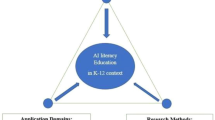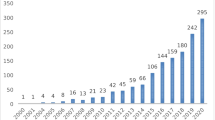Abstract
The increased availability of tablet technologies in many homes and early childhood educational settings has transformed play-time and the subsequent opportunities that emerge for literacy learning. What children do with the digital applications (apps) on these technologies demands our attention, particularly as we consider the ever-increasing market of apps marketed to enhance the basic literacy skills. While there are varying degrees of quality amongst available apps, some apps have potential to foster children’s play and language development in unexpected and interesting ways. As educators, we need to acknowledge the role ‘digital play’ can play in our pedagogical interactions and the possibilities these offer for literacy learning. To do this, we need to examine ways that children engage with technology as they learn to read, write, listen, and communicate. This paper argues children’s digital play offers teachers new opportunities to support, inform, reform, or transform the literacy with experiences we encourage children to participate.
Similar content being viewed by others
References
Australian Bureau of Statistics (2012). Children’s Participation in Cultural and Leisure Activities: Internet and Mobile Phones. Retrieved from http://www.abs.gov.au/ausstats/abs@.nsf/Latestproducts/4901.0
Australian Curriculum, Assessment and Reporting Authority (2015). F-10 Curriculum: General Capabilities, Literacy. Retrieved from http://www.australiancurriculum.edu.au/generalcapabilities/literacy/introduction/introduction
Belle, D. (Ed.). (1989). Children’s social networks and social supports (Vol. 136). New York: John Wiley & Sons.
Braun, V., & Clarke, V. (2006). Using thematic analysis in psychology. Qualitative research in psychology, 3 (2), 77–101.
Bruner, E.M. (Ed.). (1986). The anthropology of experience. Chicago: University of Illinois Press.
Buckleitner, W. (2011). The children’s e-book revisited. Children’s Technology Review, 19 (1), 6–10.
Cazden, C.B. (2003). Sustaining indigenous languages in cyberspace (pp 53–57) In J. Reyhner, O. Trujillo, R.L. Carrasco & L. Lockhard (Eds.). Nurturing Native Languages, Flagstaff: Northern Arizona University.
Chiong, C., & Shuler, C. (2010). Learning: Is there an app for that. In Investigations of young children’s usage and learning with mobile devices and apps. New York: The Joan Ganz Cooney Center at Sesame Workshop.
Comber, B., & Hill, S. (2000). Socio-economic disadvantage, literacy and social justice: Learning from longitudinal case study research. The Australian Educational Researcher, 27 (3), 79–97.
Comber, B., & Kamler, B. (2004). Getting out of deficit: Pedagogies of reconnection. Teaching education, 15 (3), 293–310.
Common Sense Media (2013). Zero to Eight: Children’s Media Use. Retreived from https://www.commonsensemedia.org/research/zero-to-eight-childrens-media-use-2013
Department of Education, Employment and Workplace Relations. (2009). Belonging, being & becoming: The early years learning framework for Australia. Retrieved from http://foi.deewr.gov.au/node/2632
Dyson, A.H. (1993). Social worlds of children: Learning to write in an urban primary school. New York: Teachers College Press.
Edwards, S. (2013). Digital play in the early years: a contextual response to the problem of integrating technologies and playbased pedagogies in the early childhood curriculum. European Early Childhood Education Research Journal, 21 (2), 199–212.
Farver, J.A.M. (1992). Communicating shared meaning in social pretend play. Early Childhood Research Quarterly, 7 (4), 501–516.
Fenwick, T., Edwards, R., & Sawchuk, P. (2011). Emerging approaches to educational research: Tracing the socio-material. London: Routledge.
Garvey, C. (1990). Play (Vol. 27). Cambridge, MA: Harvard University Press.
Grieshaber, S. (2008). Interrupting stereotypes: Teaching and the education of young children. Early Education and Development, 19 (3), 505–518.
Gutiérrez, K. (2002). Studying cultural practices in urban learning communities. Human Development, 45 (4), 312–321.
Harste, J.C. (1990). Inquiry-based instruction. Primary Voices, K–6, 1 (1), 3–8.
Harste, J.C. (2003). What do we mean by literacy now. Voices from the Middle, 10 (3), 8–12.
Hart, B., & Risley, T.R. (1995). Meaningful differences in the everyday experience of young American children. Baltimore, MD: Paul H Brookes Publishing.
Heath, S.B. (1983). Ways with words: Language, life and work in communities and classrooms. Cambridge, UK: Cambridge University Press.
Hutchison, A., & Reinking, D. (2011). Teachers’ perceptions of integrating information and communication technologies into literacy instruction: A National Survey in the U.S. Reading Research Quarterly, 46 (4), 308–329.
Johnson, J.E., & Christie, J.F. (2009). Play and digital media. Computers in the Schools, 26 (4), 284–289.
Leoni, E. (2010). Apple’s announcement of the new iPad: How will it affect education? Retrieved from http://www.edutopia.org/apple-ipad-education?page=1
Lieberman, D.A., Fisk, M.C., & Biely, E. (2009). Digital games for young children ages three to six: From research to design. Computers in the Schools, 26 (4), 299–313.
Lillard, A.S., Lerner, M.D., Hopkins, E.J., Dore, R.A., Smith, E.D., & Palmquist, C.M. (2013). The impact of pretend play on children’s development: A review of the evidence. Psychological Bulletin, 139 (1), 1.
Livingstone, S. (2002). Young people and new media: Childhood and the changing media environment. Thousand Oaks, CA: Sage.
Marsh, J. (2010). Young children’s play in online virtual worlds. Journal of Early Childhood Research, 8 (1), 23–39.
Marsh, J., & Hallet, E. (Eds.). (2008). Desirable literacies: Approaches to language and literacy in the early years. Thousand Oaks, CA: Sage.
Meek, D. (2012). YouTube and social movements: A phenomenological analysis of participation, events and cyberplace. Antipode, 44 (4), 1429–1448.
Neuman, S.B., & Roskos, K. (1990). Play, print, and purpose: Enriching play environments for literacy development. The Reading Teacher, 44, 214–221.
O’Keeffe, G.S., & Clarke-Pearson, K. (2011). The impact of social media on children, adolescents, and families. Pediatrics, 127 (4), 800–804.
Pahl, K. & Rowsell, J. (20l0). Artifactual Literacies: Every Object Tells a Story. New York: Teachers College Press.
Saine, P. (2012). iPods, iPads, and the SMARTBoard: Transforming literacy instruction and student learning. New England Reading Association Journal, 47 (2), 74.
Salonius-Pasternak, D.E., & Gelfond, H.S. (2005). The next level of research on electronic play: Potential benefits and contextual influences for children and adolescents. Human Technology: An Interdisciplinary Journal on Humans in ICT Environments, 1 (1), 5–22.
Schank, R.C. (1990). Tell me a story: A new look at real and artificial memory. New York: Charles Scribner’s Sons.
Shuman, A. (2007). Entitlement and empathy in personal narrative. In M. Bamberg (Ed.), Narrative: State of the art (pp. 175–184). Amsterdam: John Benjamins.
Smilansky, S. (1968). The effects of sociodramatic play on disadvantaged preschool children. New York: John Wiley and Sons, Inc.
Siraj-Blatchford, I. (2009). Conceptualising progression in the pedagogy of play and sustained shared thinking in early childhood education: A Vygotskian perspective. Educational and Child Psychology, 26 (2), 77–89.
Stauffer, R.G. (1970). The Language-Experience Approach to the Teaching of Reading. New York: Harper & Row, Publishers Inc.
UNICEF (2009). New York: UNICEF; 2009. The State of the world’s children. Retrieved from, http://www.unicef.org/sowc/
Verenikina, I., Harris, P. & Lysaght, P. (2003). Child’s Play: Computer Games, Theories of Play and Children’s Development. In Wright, J., McDougall, A., Murnane, J. & Lowe, J. (Eds.). Young Children and Learning Technologies. (99–106). Retrieved from, http://www.crpit.com/confpapers/CRPITV-34Verenikina.pdf
Verenikina, I., Herrington, J., Peterson, R., & Mantei, J. (2010). Computers and play in early childhood: Affordances and limitations. Journal of Interactive Learning Research, 21 (1), 139–159.
Verenikina, I. & Kervin, L. (2011). ‘iPads, Digital Play and Pre-schoolers,’ He Kupu, 2, (5) Retreived from http://www.hekupu.ac.nz/index.php?type=journal&issue=15&journal=262
Vygotsky, L.S. (1978). Mind and society: The development of higher mental processes. Cambridge MA, London: Harvard University Press.
Author information
Authors and Affiliations
Rights and permissions
About this article
Cite this article
Kervin, L. Powerful and playful literacy learning with digital technologies. AJLL 39, 64–73 (2016). https://doi.org/10.1007/BF03651907
Published:
Issue Date:
DOI: https://doi.org/10.1007/BF03651907




